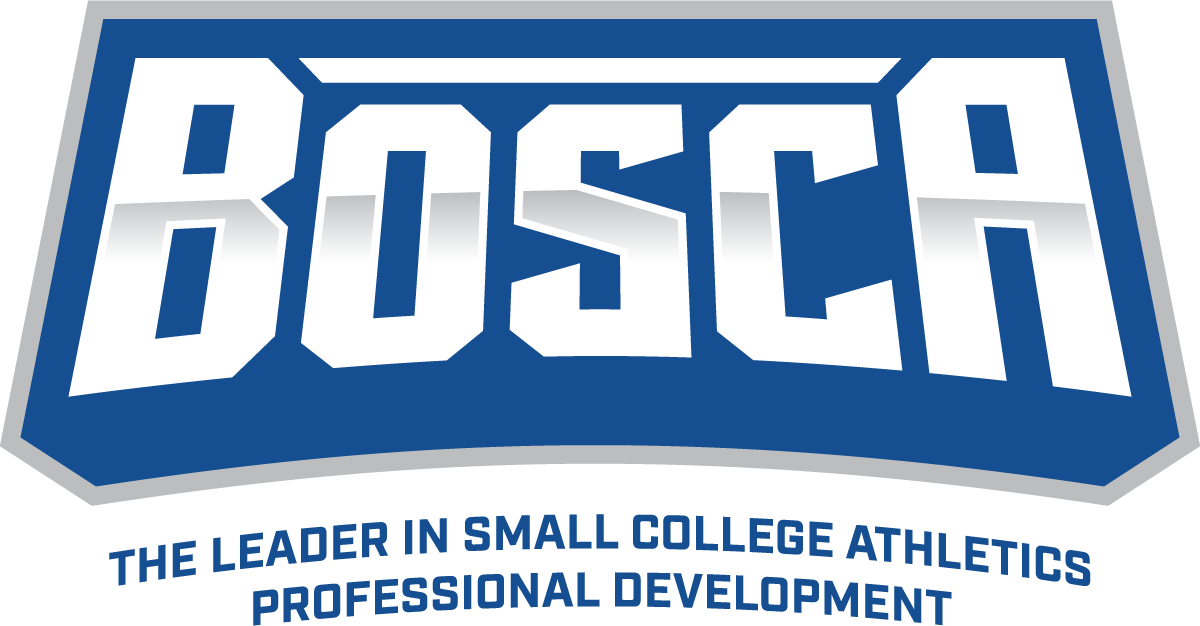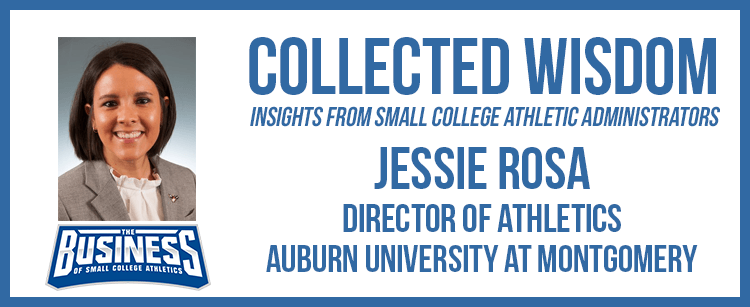Collected Wisdom - Jessie Rosa
Athletic Director - Auburn University at Montgomery
Collected Wisdom is an interview series featuring insights from small college athletic administrators. Our thanks this week to J esse Rosa, Athletic Director at Auburn University - Montgomery for sharing her time and thoughts.
How did you get started in College Athletics?
I was a communications major and in one of my advising sessions during my Junior year, my advisor mentioned that I could complete an internship in place of a class. Getting coursework credit outside of the classroom was an easy decision. That very day, I walked into our Sports Information Director’s office and asked him if I could help with press releases, game re-caps, student spotlight stories, etc. I was FREE help so his answer was yes. I did everything and anything that was asked of me whether it was for Sports Information, Game Day set-up, ticketing --- anything. In small college Athletics, you have no choice but to wear multiple hats. I think administrators and support staff saw that I would do what was asked of me which was likely a big part in getting my first offer at a full-time position with the department.
How does your experience as an accomplished
student-athlete impact the way that you approach your position as Athletic
Director?
Accomplished is generous (but I’ll take it). I think it absolutely impacts it. Funny story that not a lot of people know. I was a 2-sport athlete my Freshman year and was essentially kicked off the basketball team. When that happened, my soccer coach mentored me a lot and gave me a little more scholarship money that allowed me to stay at AUM. I didn’t earn that, at that point in time. But I made sure I earned it and repaid him with effort from that point forward. I grew up a lot and changed because of that second chance. Imagine how different my life would be, if he hadn’t done that? I try to be the person my soccer coach was, but as the AD. The chair I sit in now can be very influential and if that means giving someone a second chance, then so be it. Another funny twist --- Guess what happened to that guy that kicked me off the basketball team? He later became the AD and when I was a GA for our women’s soccer team, he walked out onto the soccer field and told me he wanted me to work for him. He ended up being the AD I worked under for 10 years. Not a bad result for any of us, all because of a second chance.
You have spent 10 years at AUM and worked
your way up from student assistant to Athletic Director…what was that like?
It’s been an incredible journey. I stepped on AUM’s campus at the age of 17 for pre-season. The biggest advantage in having held all the roles I have is that I’ve walked in others shoes. From intern to student-worker to graduate assistant and then a handful of full-time positions, I can relate to people who currently hold those roles. I love being a Warhawk. It’s all I know how to be. Being the Athletics Director at institution like AUM, plus the fact that it’s my alma mater, is something not a lot of people get to experience. If I have a bad day, I reflect on what a unique opportunity it is, and how fortunate I’ve been. Needless to say, my bad day is quickly over.
What advice do you have for Asst/Assoc AD’s
that aspire to become Athletic Directors?
What steps should they take to prepare themselves for this role and
position themselves for opportunities that arise?
Have an honest conversation with your AD about what your career aspirations are. If you don’t feel like your relationship with your AD is strong enough, then find a mentor in an AD role. If you can have both --- even better. Be open to all opportunities. I think when people initially think they’re ready to make the move, they get tunnel vision in their approach for jobs. Be selective but don’t overlook any opportunity. Certain jobs may not have everything on your checklist, but that just means you’ll have the opportunity to write in your own checks with things you achieve. Don’t overlook how you can leave your mark.
You spent 6 months as the “Interim”
Athletic Director before being hired for the permanent position. What are the pros and cons of being an
interim A.D.?
It’s a unique position for sure. It’s positive because it’s an opportunity that NO other candidate gets. I was able to have in depth conversations with my Chancellor, which allowed me to have insight into what his expectations were for the department and the AD position. Having institutional knowledge that no other candidate had was also critical. One of the strengths I played in the interview process was that there wasn’t a learning curve as it related to knowing the institution. I already had relationships and rapport with other departments, the coaches and staff members. The community was already aware of who I was. A seamless transition is what I pitched, because it was what I could provide better than any other candidate. I think the biggest con was that I had a very realistic approach to challenges. A lot of times in the interview process people sell a vision of what “life” can be without knowing the challenges. If something doesn’t work out the way you planned for it to, external candidates can fall back on the fact that they didn’t know what some of the limitations were. My expectations were reasonable because I knew the barriers we faced. As an internal candidate, I had to balance selling improvements and progress with the real limitations that I knew we had. That was really difficult to manage both in the interim process and in the interview process. I think in the end, it worked out because coaches and staff members know that I was honest with what could be achieved.
Who are some of your mentors? Folks that have helped you along the way?
Both of my Head Coaches as a student-athlete, Brett Teach (VCU) and Wulf Koch (AUM). They were both so supportive at the beginning of my career and still are some of my biggest fans today, and vice-versa. My former boss, Steve Crotz has probably had the biggest influence over me. I worked for him for close to 10 years and he molded me as an athletics administrator. Kurt Patberg was our conference commissioner when we were in the SSAC/NAIA. He is now our consultant through the NCAA transition process and has also worked with us on position vacancies. It’s funny how paths in this industry continue to cross, despite change in roles. Anytime I’ve called Jim Abbot he’s answered. I met him at the BOSCA conference a handful of years ago and knew that he was someone I could learn a lot from. Keri Becker (GVSU) probably thinks she’s on my speed dial. Being a first-time AD isn’t easy, much less through a transition process. She’s become my go-to. I’ve learned not to be scared to ask questions. Once I learned that, I decided to ask those questions of the best in the business. The people I just mentioned are just that. I’ve been very fortunate that they’ve been so receptive to me.
AUM recently moved to the final year of its
transition from the NAIA to NCAA D2.
What has that experience been like?
It’s demanding. But it should be. We’re constantly told by AMA and the vendor assigned to us that their expectation of us is to be the crème of the crop as it relates to our internal operations, policies and procedures. We’ve been held to a very high standard, which has forced us to get better. There have been highs and lows throughout our process, but with one year left, you can feel the excitement among our students, coaches & staff as we move into Year 3.
How much of your time is spent on
“transition” related work?
I spend time on the transition every day. It is paramount that you show continuous progress. We have to get a little better every day. Whether it’s revising policies and procedures, working on required reports or simply coming up with ideas to enhance what we do, we’re always trying to get better. Honestly, it’s all I’ve known as an AD which I consider a positive. You should always try to do more and I feel as though this transition process has wired me that way as an AD.
What are the primary “transition related”
efforts that you have had to undertake?
If primary and transition are going to be used in the same sentence, I’m not going to talk about myself. This process is compliance heavy and that piece of it has been spearheaded by our Assistant AD for Compliance Andreè Houston. Her efforts, along with the willingness of our Admissions, Registrar and Financial Aid offices to partner with us in improving our operations, is why we’ve been successful the last two years.
What is your favorite part of your job?
Earning it. Is there anything better than someone telling you “You earned it!”? I am get-in-an-argument-over-board-games competitive. I’ve toned it down, but I want to win. And that’s not just winning in each sport. It’s winning with team GPA targets and community service hour goals. As AD, being the best means our student-athletes and coaches being the best. I love seeing the pay-off from all of the work they put in. Another part of my job that I’ve really enjoyed over the years is seeing the success of those who have served us in Graduate Assistant capacities. We’ve been very fortunate to have some quality GA’s over the years who have gone on to establish themselves as college administrators. Again, seeing their hard work payoff is special. Earning it (whatever it is), will always be my favorite part of the job.
What is the biggest challenge in your job?
Leading isn’t easy. You have to make difficult and unpopular decisions, but just because you’re the AD, it doesn’t make it any easier. You’ve got to find a healthy balance between being liked and respected. If you’re in this business you’re likely ambitious, which means that as AD you’re managing a lot of egos. It’s challenging. But I love it and I think that’s what makes me a good leader. I welcome the challenge.
How do you measure success in your
department?
Each of us has concrete goals and tasks. One of the first things I did as an AD was meet with our Human Resources office to re-vamp what they call a Performance Planning Worksheet. It took a lot of time to fine-tune it, but I thought it was critical in making sure our staff knew what their expectations were. Specific tasks and measurable goals were outlined for everything from recruitment and competition to community service and administrative responsibilities. I also think it’s critical that you understand that each program is different. Our tennis program is extremely accomplished having won 23 National Championships in the NAIA, between the women and men. The tennis coach knows that our expectation is for us to immediately compete for a conference championship once we are through the transition process and post-season eligible. On the other hand, we celebrated our inaugural volleyball season in 2017. Do I want to compete for a volleyball championship as soon as possible? Absolutely. Is it fair for me to expect that we do that our first year as an active DII member in that particular sport? Probably not. For that program, it will be more of an evaluation of our improvement from year to year.
You are in the midst of a
coaching search. What are 1-2 qualities
that you look for when hiring a head coach?
Integrity and progressive/ sustained success. The first speaks to your character, nor can it be taught. I very rarely make guarantees. You’re not guaranteed success with integrity alone. You need more. But without it, I guarantee you won’t be successful in the long-term. A lack of integrity will eventually catch up to you and is a non-negotiable for me. I say progressive/ sustained success vs. success because it’s more than just adding up wins and championships. Where are you now vs. 5 years ago? Has there been positive progression or have you sustained a quality program? If you’ve got those 2 qualities, everything else usually falls into place.
What advice do you have for
young people that are looking to start a career in college athletics?
1. Get involved yesterday. I can’t tell you how many Seniors with an interest in a career in college athletics come into my office to ask what they should do and it’s the FIRST time in 4 year’s I’ve ever seen them. Chances are you are going to work for FREE or not even minimum wage if you start tallying up the hours. Don’t worry about that --- just work. Live in a cheap apartment, skip the $5 cups of coffee and pack your lunch. Prove yourself. It won’t happen overnight, but the sooner you start, the sooner it will pay-off.
2. Know that this industry is not an 8-5 career. No part, no position ever is or ever will be. You are jumping into a career that is also a lifestyle. Prepare yourself for that, and ask yourself if you’re willing to make that commitment.
3. Take time to reflect. Self-evaluate. I do that a lot now, but wish I would have been more receptive to criticism and other’s ideas/ opinions when I was younger. You don’t know it all and you’re not supposed to. People are flawed. You are going to make mistakes. The key is to show people you can make adjustments in order to get the necessary results.
How do you balance your
personal and professional life?
3 things --- 1. Being aware/intentional 2. Support from family and 3. Communication. My priorities are family, work, health, friends. Honestly, it’s impossible for each of those to be given a strict 25% of my time and attention, every single day. I’m not a 25% person. I’m a 100% person. I think that people make the mistake of trying to make everything that’s important to them a priority. If you do that, you’re not really prioritizing. I think your priorities need to be balanced over time and not all at once. We’re going through a key Head Coach search right now, the academic year is about to start, and we’re in Year 3 of a transition process. I’m aware that right now, work is where I’m spending the majority of my time. Because of that I’m very intentional about taking advantage of the moments where I do get to break away. My parents moved to Montgomery around a year ago (definitely because of the grandbabies) which has been a tremendous help with my 2-year-old daughter. My wife was a collegiate student-athlete herself so she understands the demands of the job. She also lets me know when it’s time to put the phone down or close the laptop. It’s imperative that you have a strong support system. Despite the fact that more time is being spent at the office right now, I always try to make a conscious effort to communicate that my family is the most important thing to me. Not only is that communication key with my family, but also with my staff. Tim Lutz (Assistant AD) and myself are the primary Game Day administrators for of our home events. The majority of the time, either he or I serve in that capacity on game day. This past Spring, Charlee (my daughter) had baby-gym every Wednesday. He knew he had Wednesdays. Andrew and Matthew (his boys) had baseball on Tuesdays and Thursdays. I knew I had Tuesdays and Thursdays. Be intentional and communicate and you’ll begin to create a balance. If you are fortunate enough to have a strong support system, you’ll be even closer to that balance.
You have attended the Business
of Small College Athletics workshop in the past. What would you tell someone that is
considering attending?
No question --- attend. The fact that the agenda is filled with other small college administrators is what makes BOSCA workshop such a success. You’ll get real examples of how you can implement certain programs and ideas immediately. What you have won’t be a wish list of what you would like to do if you had unlimited resources. The conversations that you’ll have will be about ideas that are realistic for our world of small college athletics.




